 Petzlover
Petzlover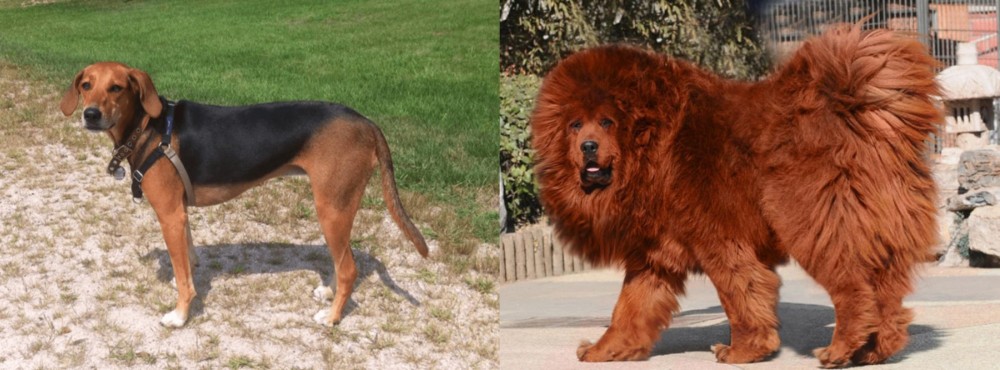 Kerry Beagle is originated from Ireland but Himalayan Mastiff is originated from India. Kerry Beagle may grow 10 cm / 3 inches shorter than Himalayan Mastiff. Kerry Beagle may weigh 51 kg / 112 pounds lesser than Himalayan Mastiff. Both Kerry Beagle and Himalayan Mastiff has almost same life span. Both Kerry Beagle and Himalayan Mastiff has same litter size. Kerry Beagle requires Low Maintenance. But Himalayan Mastiff requires Moderate Maintenance
Kerry Beagle is originated from Ireland but Himalayan Mastiff is originated from India. Kerry Beagle may grow 10 cm / 3 inches shorter than Himalayan Mastiff. Kerry Beagle may weigh 51 kg / 112 pounds lesser than Himalayan Mastiff. Both Kerry Beagle and Himalayan Mastiff has almost same life span. Both Kerry Beagle and Himalayan Mastiff has same litter size. Kerry Beagle requires Low Maintenance. But Himalayan Mastiff requires Moderate Maintenance
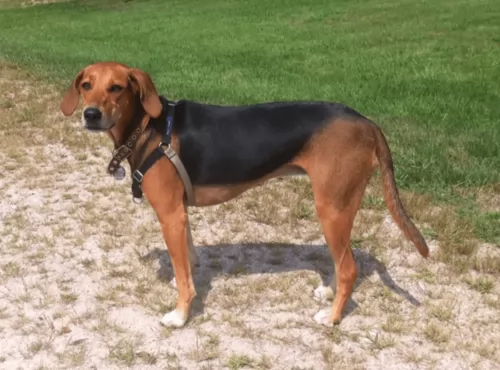 The Kerry Beagle is an ancient dog breed, thought to go back as far as the 16th century and looked upon as one of the oldest of all the Irish dog breeds. The dog was introduced to Ireland by the Celts.
The Kerry Beagle is an ancient dog breed, thought to go back as far as the 16th century and looked upon as one of the oldest of all the Irish dog breeds. The dog was introduced to Ireland by the Celts.
It is believed to have descended from the Old Southern Hound or Celtic Hounds.The Kerry Beagle was taken by Irish immigrants to America and is a foundation breed in the development of the Coonhound for hunting and scenting.
The Kerry Beagle isn't recognized by the AKC but has been recognized by the Irish Kennel Club in 1991. It is still rare outside of Ireland and it hasn't been recognized by major kennel clubs.
 The Himalayan Mastiff or Tibetan Mastiff is an ancient breed. Bred to be guardians of the flock, they could take care of leopards and wolves or anything else that tied to hurt the flock. The Himalaya Mastiff is found in the Himalayan area of Tibet. They are descendants of the Tibetan dogs that developed almost any Mastiff or Molosser on earth. They may have been in the mountains since the early 1100 BC. and have been fairly isolated. It was in this isolation that the Himalayan Mastiff developed.
The Himalayan Mastiff or Tibetan Mastiff is an ancient breed. Bred to be guardians of the flock, they could take care of leopards and wolves or anything else that tied to hurt the flock. The Himalaya Mastiff is found in the Himalayan area of Tibet. They are descendants of the Tibetan dogs that developed almost any Mastiff or Molosser on earth. They may have been in the mountains since the early 1100 BC. and have been fairly isolated. It was in this isolation that the Himalayan Mastiff developed.
Their function at that time was mostly to guard property. In some circumstances an entire village is guarded by one dog. It was also during this period that the breed was taught to be aggressive by tying them up as puppies. They guarded families while the men moved the village flock higher up in the mountains. They stayed in isolation until the mid-1800’s when the Queen of England was given a Himalayan Mastiff. For thousands of years, this dog was a nomad.
Soon the breed was being exported to England. A standard was developed, and the British began to breed them. Next, they were exported to Nepal, Afghanistan, India and the United States. They are rare in Tibet these days but more popular than ever in England and the United States. The first American Himalaya Tibetan Mastiff Association came into being in 1974 and in 2006 it was recognized by the AKC.
Today in the West, the Himalayan is a domesticated, family dog. It hardly fits in an apartment of course. These new western Himalayan Mastiffs are more easy- going than the Tibetan ones, but they are still wary of strangers and somewhat aloof. They are also still very protective and nocturnal. They are smart, independent and stubborn. They are not easy to train but socialization and obedience training is essential.
A study done in 2011 showed that it is very likely that many large breed dogs were descended from this Mastiff. This includes the St. Bernard, the Rottweiler, Bernese Mountain Dog and the Great Pyrenees. Later studies showed that the Mastiff’s ability to survive in the rare air of the Himalayans was due to interbreeding with Tibetan wolves in ancient, prehistoric times. Now they are competing in the Westminster Kennel Club Dog Show.
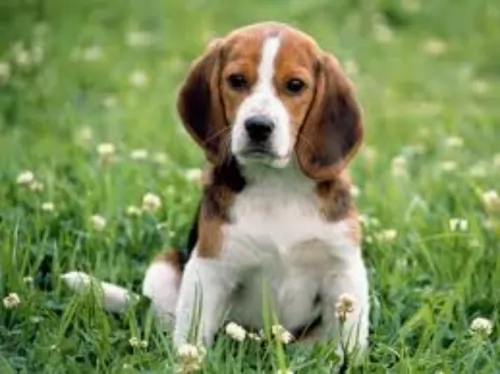 The Kerry Beagle is a medium sized dog with a solid physique. He stands at about 56 – 61cm and weighs between 22 and 27kg. He has a broad head with drop ears. His eyes are large and deep set and are a yellow to brownish color, giving the dog an intelligent expression.
The Kerry Beagle is a medium sized dog with a solid physique. He stands at about 56 – 61cm and weighs between 22 and 27kg. He has a broad head with drop ears. His eyes are large and deep set and are a yellow to brownish color, giving the dog an intelligent expression.
His coat is short and the most common color for this dog is black and tan, but you can also find tan and white or some blue mottling as well. He is a lean, muscled dog with a deep chest and legs which are slim and long, providing the dog with the ability to pick up speed on a hunt. The tail of the dog is long and slightly curved and carried level.
As a packhound this dog is a serious hunter. He may look aggressive as he goes after his prey but he is actually a calm, well-balanced, friendly dog who forms a strong, loving relationship with his human family.
He is also gentle and playful with children in the home and also gets on well with other dogs too. He is intelligent and will readily respond to training and socialization. It's a dog that just loves being outside, especially when there is something to do, such as playing ball games or going on a long walk.
He is alert and inquisitive and makes an excellent watchdog. A home with a good sized garden will be ideal for the Kerry Beagle, though it can be kept in small gardens in the city too, just so long as he is given the opportunity for daily exercise.
 The Himalayan Mastiff is a giant, massive dog longer than it is tall. The breed has a heavy, broad head and square muzzle. They have black noses, a level bite and almond shaped, slanted, deep set eyes. They are brown, and the ears hang close to the head. They are heavy, muscular and sturdy. They have a feathered tail curving over their back. With a heavy, thick double coat and mane they resemble a lion at times. The coat can be brown, black, and gray-blue with gold or tan markings. These are impressive and noble dogs, athletic, with cat like feet. They are agile and light on their feet.
The Himalayan Mastiff is a giant, massive dog longer than it is tall. The breed has a heavy, broad head and square muzzle. They have black noses, a level bite and almond shaped, slanted, deep set eyes. They are brown, and the ears hang close to the head. They are heavy, muscular and sturdy. They have a feathered tail curving over their back. With a heavy, thick double coat and mane they resemble a lion at times. The coat can be brown, black, and gray-blue with gold or tan markings. These are impressive and noble dogs, athletic, with cat like feet. They are agile and light on their feet.
According to some breeders there are two different kinds or types of Himalayan Mastiff. These are the Tsang-khyi or the monastery mastiff type and the Do-khyi or the nomad mastiff type. The monastery is a heavier, taller dog who face is very wrinkled while the nomad is a leaner dog with less facial wrinkles. In any litter there can be both kinds. The kind of work that was given to each dog was dependent on their type. The Monastery kind is given stationary jobs and the nomad kind got the active jobs.
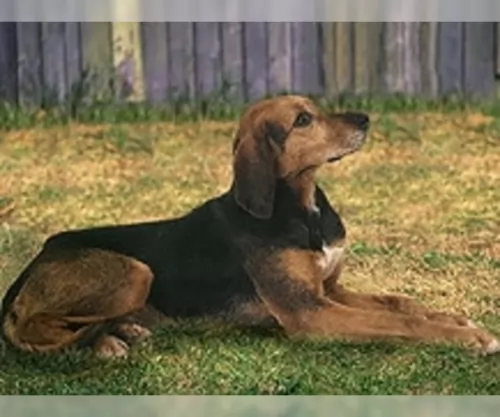 The Kerry Beagle may well be quite an aggressive dog when showing off his hunting skills, but when it comes to being around his human family, he softens up and becomes a gentle, loving friend.
The Kerry Beagle may well be quite an aggressive dog when showing off his hunting skills, but when it comes to being around his human family, he softens up and becomes a gentle, loving friend.
He is an affectionate playmate for children and also gets on well with other dogs you may have in the home.
Your Kerry Beagle is alert, intelligent and active, and when you have one of them as a 4-legged family member, you'll discover what a wonderful, devoted companion he can be.
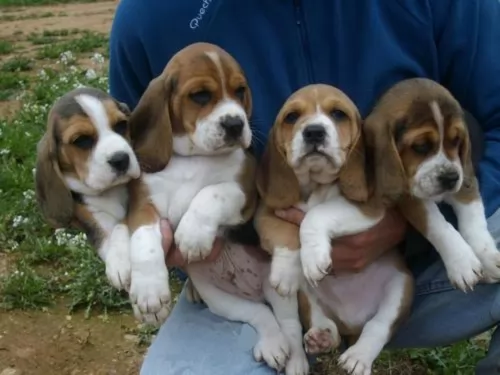 If your Kerry Beagle is ill or injured you need to get him to the vet for a full assessment. As a puppy he will also need certain vaccinations to protect him from some life-threatening illnesses as well as getting de-wormed.
If your Kerry Beagle is ill or injured you need to get him to the vet for a full assessment. As a puppy he will also need certain vaccinations to protect him from some life-threatening illnesses as well as getting de-wormed.
Bad smelling breath is a symptom that your pet's teeth need checking. If you're not sure how to maintain his teeth, make sure your Kerry Beagle has professional dental cleaning to ensure his gums and teeth are kept in a healthy state. Your vet will give you advise on how to watch for periodontal disease.
In hot weather particularly, check your dog over for fleas and ticks and remove them.
Heartworm is a fatal disease which which can affect your dog. Speak to your vet about treatments as living in a hot, wet area opens you pet up to bites from infected mosquitoes.
 Being a large breed of canine, the Himalayan Mastiff has some of the typical health issues of large dogs. However, they also face a serious genetic disorder as well.
Being a large breed of canine, the Himalayan Mastiff has some of the typical health issues of large dogs. However, they also face a serious genetic disorder as well.
Canine Inherited Demyelinative Neuropathy (CIDN) – a fatal disorder seen in puppies by seven weeks of age. Puppies die before they are 5 months old.
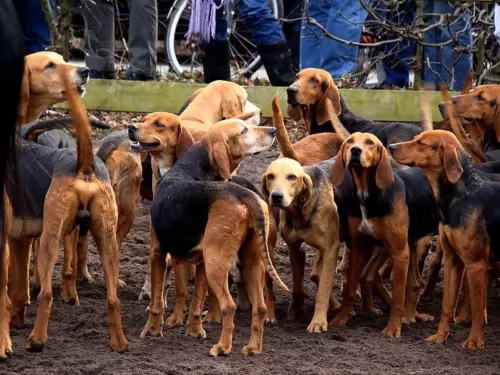 Because of the short coat of the Kerry Beagle, he is looked upon as a low maintenance dog. He doesn't shed very much, and simple grooming is required such as brushing the coat twice a week.
Because of the short coat of the Kerry Beagle, he is looked upon as a low maintenance dog. He doesn't shed very much, and simple grooming is required such as brushing the coat twice a week.
His nails will also need to be clipped, as left long, they can hook on things and rip your pet's flesh.
You will need to check his teeth and also check inside his ears. Dogs with floppy ears are more prone to infection in the ears and this can cause terrible pain for your pet.
If you keep your Kerry Beagle as a hunting dog, you will know that active dogs like these have different dietary requirements to companion dogs.
All that activity requires top quality nutrition and a certain amount of calories. If you're buying dry kibble, make sure its the highest quality so that he doesn't require huge portions to satisfy him. Leading canine nutritionists recommend a hunting dog like this be fed a large meal once a day and preferably in the evening, after all the hunting action.
 This breed will eat less than you think they should but don’t overfeed. Puppies need a solid dry food for large dogs. You can free feed 1 cup three times per day.
This breed will eat less than you think they should but don’t overfeed. Puppies need a solid dry food for large dogs. You can free feed 1 cup three times per day.
For dogs over a year old you can free feed anywhere from two to four cups of dry food per day. Unlike many other breeds, the Himalaya Mastiff will only eat when hungry and they may not eat more than once a day. They will not overeat. The males might not eat at all when females are in season if they are around them.
They have good strength and athletic ability.
The Himalayan Mastiff needs regular, routine walks. It is important during these walks that the human leads the way, or the dog heals. Do not overwork a young Himalayan Mastiff. They need work related jobs like structured play time, walking the boundary of their territory, playing frisbee or catch. They work and play in short bursts then rest.